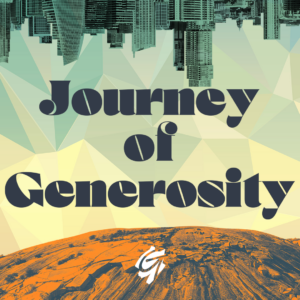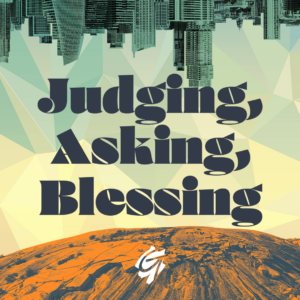Everyone is religious.
Some of you are probably thinking, “Heck, no! Not me!”
● “I’m spiritual, but not religious”
● “I love Jesus, but not religion”
● Or, “I came to this church to get away from religion”
Hear me out, though. We all have something in our lives we treat as ultimate, right?
We are all living our days for something. We all love something supremely and whether we
realize it or not, we orient ourselves toward whatever we love, whatever is ultimate and we think
gives life fullness or meaning. Our thoughts, desires, and therefore, our daily habits and practices,
are all geared toward pursuing that “ultimate” thing. In the words of philosopher James K.A.
Smith, “you are what you love.” What we ultimately love is what ultimately forms us. It is what we
worship. And our practice of this worship is religion.
Every one of us is religious because we are all living for something and whatever that thing is,
whether it’s your family, your job, your success, your politics, your likes on Instagram, or God..
Don’t get me wrong, these things are not necessarily bad things. We don’t necessarily love the
wrong things; we love the right things in the wrong order. Theologian Augustine called it
disordered love.
You’ve may have heard people say that it’s important that we prioritize or “put God first” in your
life over everything else, which probably looks like this:
- God
- Family
- Friends
- Job
- Interests
But is this really realistic or helpful? And, what does it practically look like to do this?
Rather than having a list of priorities, consider all of your life- your relationships, your job, your
interests as priorities that revolve around God at the center. This means that all of your life is
saturated in the love of God, and therefore, everything else is rightly loved. It’s seeing every area
of your life through the lens of your love and obedience to God.
So, how do we rightly order our loves, with God at the center?
It must begin at the level of our habits.
(Our rhythms and practices)
God:
In this series, we’ve been following the story of the people of Israel, God’s people, as they
are preparing to enter into the Promised land- this long-awaited home that is said to be “flowing
with milk and honey.” After being freed from 400 years of slavery in Egypt and wandering in the
desert for another 40 as a result of disobedience and disbelief, a new generation is gearing up to
cross the finish line into God’s land and blessing. Last week we looked at their new leader,
Joshua as he prepared to lead the charge, but I want to rewind a little to show what it took to
educate and equip these people for what they are about to do. The whole book of Deuteronomy
is Moses explaining the Law to this new generation and a plea to them to be faithful to the
covenant God made with them and not forget who they are. So, let’s look at chapter 6 where
Moses is instructing them on how they are to conduct themselves so that they might live long and
prosper in the land they are about to occupy (Deut. 5:33).
Deuteronomy 6:4-5 (NLT) “Listen, O Israel! The LORD is our God, the LORD alone. And you must
love the LORD your God with all your heart, all your soul, and all your strength.
This command became not only something the Jewish people knew and recited, but something
they prayed morning and evening, daily. It became known to them as the “Shema” which means
“to hear” or “listen” in Hebrew.
These words are meant to be much more than sounds hitting their ears. The word “shema” in
Hebrew implies listening with interest with the intent to act on it. Hearing and obeying in Hebrew
were considered one in the same. [Parents and teachers, don’t you feel this way about your
kids? When I instruct my son to do something, I don’t want him to just hear my words, but to
act on them.
Ok, back to the Shema. As you can imagine, this command was meant to be the anthem of God’s
people, the definition of their identity. In the midst of a polytheist world, they were to be
grounded in their love and obedience to the one true God alone- it is what made them, them! The
danger of drifting away from this is that they would forget God in this new land when things are
good and they are prospering. They adopt the gods and practices of the other nations, and
ultimately forget who they are. We get this, don’t we? Do you tend to turn to God and rely on
Him when things are going well for you or when the crap has hit the fan? We are the same.
So, how were they to keep their lives centered around God? By beginning at the level of their
habits.
Deuteronomy 6:4-5 (NLT) … you must love the LORD your God with all your heart, all your soul,
and all your strength.
The sh’ma reveals two things:
- There’s only One God
- And “Loving God” does not come naturally….
And God is commanding the People of Israel to commit to those two themes…..Commit to
One God…(Himself)…And to Love Him with their whole being….knowing they’re not naturally geared
to….But what does it mean to love One God with our entire being, when it’s NOT our natural make-
up?… After all, if humanity Loved God naturally, there would have been no need for the
commandment ‘love God” in the first place.
In the same way that hearing and obeying were considered synonymous, so goes loving and
acting. Biblical love is so much more than feeling warm and fuzzy about someone, it is love in
action. It is a choice.
They were to love God alone with all their heart, soul and strength. What does this mean?
● In the same way that hearing and obeying were considered synonymous, so goes loving
and acting. Biblical love is so much more than feeling warm and fuzzy about someone, it
is love in action. It’s a choice.
● They were to love God with all their heart, soul and strength. What does this mean? It
means they were to love God with all of their being, including their thoughts, desires and
affections. They were to love God with their bodies and with all their efforts, passions and
influences.
● These words: heart (Spirit), soul (Mind) and strength (Body) all imply a wholeness- a
completeness. They are all integrated. This is redundant on purpose. It should help us
think of ourselves as the holistic, integrated beings that we are. Therefore, the command
is to love God with all of who we are, not part, wherever you are, all of the time.
Easier said than done, right? As we said at the beginning, though, if we want to live whole lives,
centered around the love of God, it must begin at the level of our habits. Moses was aware of
this, so let’s keep reading as he explains to the Israelites how to do this.
Deuteronomy 6:6-9: And you must commit yourselves wholeheartedly to these commands that I
am giving you today. Repeat them again and again to your children. Talk about them when you
are at home and when you are on the road, when you are going to bed and when you are getting
up. Tie them to your hands and wear them on your forehead as reminders. Write them on the
doorposts of your house and on your gates.
They are to love God with their whole selves by talking about Him and His word with their kids
constantly, morning and evening (meaning all the time!), coming and going. They were to keep
His word on their mind and hands, as a reminder that their thoughts and actions are to flow from
His word. And they were to cover their home with these words. There was to be no area of life
that was not saturated in their God and love for Him.
They took this very seriously, and in some ways, literally. And a mezuzah, which is a container that holds a scroll with the shema on it that they
would fix to a door frame.
For those who come from Jewish backgrounds or upbringings you may be familiar with this being
done at moments like a bar mitzvah/bat mitzvah.
These habits ensured they were “future ready”, establishing their own hearts in their identity
as God’s people and equipping the next generation to carry on.
You might be thinking, “Wow, this seems a little extreme. I’m glad this command isn’t for me.” But,
you might be surprised to know that Jesus considered it otherwise. Let’s jump to Matthew’s
gospel, chapter 22 where, just days before Jesus’ arrest and execution he is being challenged by
the religious leaders in the synagogue. One of them, an expert in the law, trying to trip Jesus up,
asks,“Teacher, which is the most important commandment in the law of Moses?”
Jesus replied, “‘You must love the LORD your God with all your heart, all your soul, and all your
mind.’ This is the first and greatest commandment. (Matt. 22:36-38 NLT).
Philosopher James K.A. Smith puts it so well,
“Jesus is a teacher who doesn’t just inform our intellect but forms our very loves. He isn’t content to
simply deposit new ideas into your mind; he is after nothing less than your wants, your loves, your
longings.”
By quoting Deuteronomy, Jesus is showing that He wants all of us, not part. And to live whole is
to love Him with all of who we are, not part.
Jesus doesn’t stop at this one command, though, but surprises the lawyer, by adding an
addendum to the “greatest commandment.”
A second is equally important: ‘Love your neighbor as yourself.’ (Matt. 22:39)
Here, Jesus is once again quoting their law from Leviticus 19. By merging these two
commandments together, He is showing that love of God is incomplete without loving neighbor,
including those considered enemies. Remember, biblical love is so much more than a feeling; it is
an action. To love our neighbor as if they were a part of us, is to love God. They are
inseparable.
So if Jesus considers these commands still applicable, what does this tell us about how
we are to live whole lives?
[You]
We are not meant to compartmentalize our love for God.
Even though we try our best! It may sound something like this:
● Ok, God, you can have my finances, but I’ll be in charge of my sexuality.
● I’ll give you my time at church, but the rest of the week I’m going to spend my free time
binge watching Netflix.
● I’ll devote my career to you, God, but I’m going to hang onto this unforgiveness toward
my co-worker.
● You can have my singleness, but I’ll keep my thought-life and porn addiction.
Oftentimes, God is kind to wake us up to this duplicity.
In 2014 I just started my first job out of graduate school working for a student ministry on a
college campus. I was the only woman, so I had a full plate of meeting with students and leading
small group bible studies. I poured everything into this. I was exhausted, but felt like I was killing
it at the same time. At the end of the fall semester when it came time for the students to fill out
evaluations for my small groups, I came across one eval that rocked my world. This young woman
totally lit into me, criticizing everything I did and essentially, not so subtly implying, that she
wished someone else had been hired instead of me. It was one bad eval out of dozens of good
ones, but it paralyzed me. I didn’t know how I was going to move forward and keep doing this
job.
Fortunately, God did not let me stay in that place much longer, He spoke to my heart: “Why is this
affecting you so much? Don’t you know that it’s not your job to be the perfect “ministry fellow”
(which was my job title)? Your job is to love me and love these women. At the end of the day, if
you’ve done that, you have done what I asked.”
This reminder (pretty much quoting the greatest commandment) unleashed me from the fear that
had overtaken me. At the same time, it had revealed something I was not seeing. My loves had
become disordered. I had created habits and practices that calibrated my heart toward loving
and caring about the opinions of others more than God’s. I was not loving and fearing God
supremely, but loving and fearing people. And as a result, I was anxious, I did not sleep well and
was constantly second-guessing everything I said and did around others. I was miserable. I
needed to reorder and restructure my loves with God at the center. I had to change my habits.
So, let me ask you this, if someone had an unlimited window into your life, how you spend
your time, your finances, what you think about…what would they say is the thing you love
most? What would they say is ultimate?
● Jesus…claims in Matthew 6:21 “For where your treasure is, there your heart will be also.”
Said another way….where your treasure is, there “you” are…So, Where is your heart this morning?
● What treasure have you been seeking?
● If those who know and love you the most could peer into your “heart?” what would they see
regarding how you spend your time, where your finances go, and what you think about…what
would they say is the thing you love most?
Now, let me ask, does your answer leave you feeling fulfilled or depleted?
For many of you, you’ve just now realized you have been leveraging your life for things that leave
you empty, bored, or anxious. This is because we are designed to find our satisfaction, value and
meaning in God and God alone. This is life to the fullest. This is what it means to live life, whole.
As St. Augustine poetically said, “You have made us for yourself, O Lord, and our hearts are
restless until they rest in You.” This is what God wants for us because He is a good God who
wants GOOD for us and He knows that the best life is life in Him!
● If we want God to be at the center of our lives, we must begin at the level of our
habits.
[We]
A practical way to do this is by creating what’s known as a Rule of Life.
● A rule of life is a schedule and set of practices and relational
rhythms that help us create space in our busy world for us to be
with Jesus, become like Jesus, and do what he did—to live “to the
full” (John 10v10) in his kingdom, and in alignment with our deepest
passions and priorities. – Practicing the Way
○ A Rule of Life doesn’t box us in; it sets us free.
○ “A good rule can set us free to be our true and best selves.
It is a working document, a kind of spiritual budget, not
carved in stone, but subject to regular review and revision.
It should support us, but never restrict us.” – Margaret
Guenther, Anglican priest.
Show a picture of a trellis–
For those of you gardeners out there, it’s like a trellis: latticework that serves as a support
and guide for climbing plants. It helps the plant grow in the right direction. In the same way, a rule
of life where God is the center, helps us grow in the right direction, in the fullness of life that God
offers.
The Rule of Life is not the end in itself (much like how we treat New Year’s resolutions). If we
treat it that way, we will either become arrogant in our accomplishments or discouraged by our
failures.
A Rule of Life is not the end, but the means by which we grow in our love for Christ and
others.
So, how does it work?
There is no right or wrong way to create your R.O.L and there are many guides and templates out
there to help. Ideally, your ROL will be holistic, it will evaluate the various areas that make up your
life, like your time, talent, finances, work, relationships, hobbies and invites you to pray through
what practices you can implement daily, weekly, monthly, quarterly and yearly that will help you
love God and live more fully in all these areas.
Here are some helpful guidelines adapted from Practicing the Way:
Crafting a Rule of Life:
- Start small: “Start where you are, not where you feel you should be. Unrealistic goals just
leave us discouraged and disillusioned. Doable, enjoyable goals move us forward in our
spiritual formation.” - Be specific: “Look for practices that are practical, concrete, and embodied, not vague
and ideological.” - Keep a healthy balance of structure and spontaneity: “Don’t let your rule become rigid,
boring, or a legalistic, dull obligation. A good rule should feel like freedom.” - Remember that a good rule is a working document: Like us, it’s dynamic, not static. Life
is a bit of a moving target, so we have to regularly review our rule and make sure it’s still
bringing us life with God and others.
Closing:
Do I have to have a rule of life?
The reality is, you already do! We all have a rule of life- practices, rhythms and habits that orient
us toward whatever we consider ultimate. The question is, do we have one that is moving us
toward loving God a little more and becoming more the person He created us to be?
If you did not know, each week we have a way for you to take each message deeper into your
week. The level of your habits. In this week’s digging deeper
(gatewaychurch.com/diggingdeeper) you’ll find a template for a rule of life.
Here’s the deal, Jesus already loves you; He already died for you; He’s already given you all His
life. The question is… does He have all of yours?
[Setup Song- Living Sacrifice]
As we discover how God moved with Israel in the Old Testament into the Promised Land,
we see that he frequently asked them to build altars. Altars served the purpose of remembrance
but also of sacrifice. So as to say “don’t forget that following me is going to cost you something.”
Some habits will have to die. Old ways of operating have to be let go. Good things that have
become gods have to be deconstructed.
In order to receive what God is calling us into the future, something in the present has to
die. Because before God multiplies he often prunes. And Jesus led us in this example, he
withheld nothing. We can let the fire of God consume that which isn’t beneficial any longer to us,
and what remains is his best for us.




